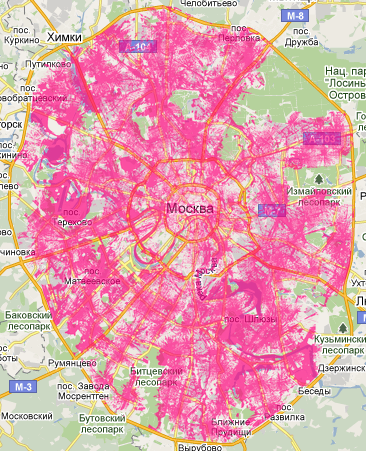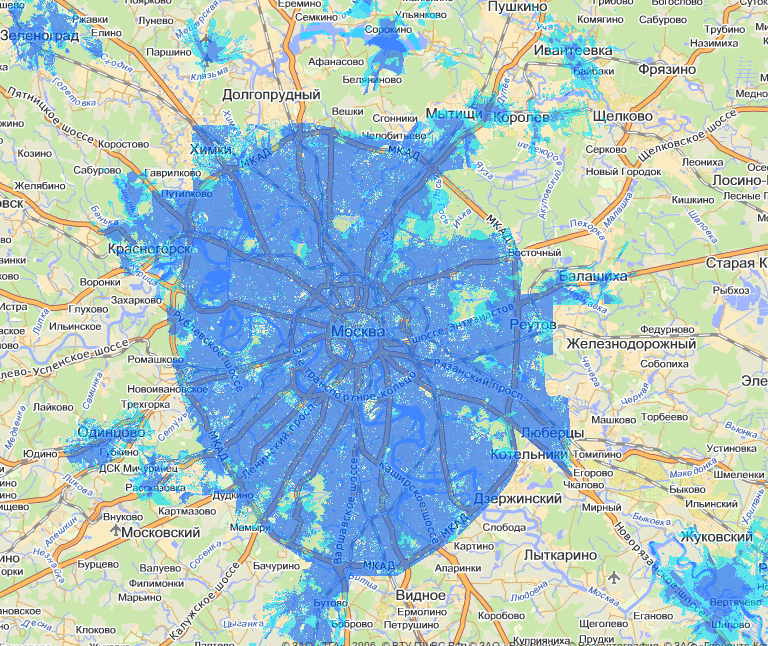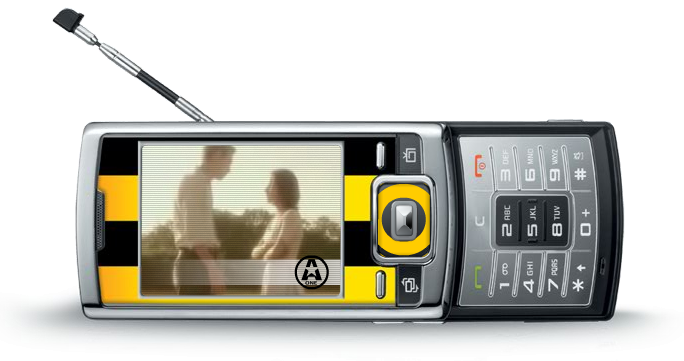Telecom capital in December

In the last month of the outgoing year, a bunch of news stories fell from companies in the market of communication services in Moscow! At first I thought to write separate materials about each of them, but then I decided to make a kind of digest. Perhaps not even the last. So I’ll call it Telecom of the capital №1. In this issue: the passion around TP "European" from MTS, the sudden intensification of competition in the WiMAX market, the launch of mobile digital television and the release of 3G on the streets of Moscow.
European passions
The first days of December were marked by a terrible panic in the blogosphere. There were shouts of “Stealing!” And calls for a boycott of a single company. Rays of hatred were heading towards MTS.
Let's try to figure out what really happened. At the very beginning of December, a footnote appeared on the www.mts.ru website in descriptions of some tariff plans, stating that users who are “silent” for 150 days will be transferred to the “European” tariff plan. The most interesting thing lay in the description of this very “European”: the monthly fee is 10,000 rubles per month.
The footnote was noticed rather quickly, and soon a wave of popular anger began on blogs. For a huge multitude of people listed contracts, SIM-cards from which a long time ago thrown away or lost. At the same time, the overwhelming majority simply forgot about the old SIM cards, considering that they were in the past and have no connection with the present. Due to the actions of MTS, the public was frightened that the operator’s goal is to drive them into a debt trap, first at a cosmic speed (329 rubles a day!), Taking the balance to a minus, and then transferring the case to collection agencies. The latter do not differ in respect for the law and the individual, and mercilessly “press” (of course, extremely rarely physically, usually psychologically) debtors, moreover they do it with the persistence of a tank, without sometimes paying attention to whether they are harassing a person. In short, the natural desire of anyone who heard about this story was to contact the MTS office as soon as possible, to break all existing contracts and never again deal with this operator, there is a good alternative.
')
In general, subscribers have no weighty reasons to trust the operator. The contract does not fix the obligation of the operator to stop providing services when leaving a balance in the negative - this is just his right. Thus, the subscriber, despite the prepaid payment system chosen by him, is a potential debtor.
It is interesting that already at the moment of the outbreak of the wave of indignation, a hastily made news appeared on the operator’s website with a very brief description of the innovation and a list of the tariff plans affected:
RED, MAXI One, New Year's Eve, RED_Text, Guest, First, Basic, Practical, All Your Favorite, Universal, Hot JEANS, JEANS 0.07, JEANS-Classic, Super JEANS, JEANS-Tonic, Regional , Free, Girlfriends , Guest , We, Cool , RED New, Calculated, Odin.Ru, Caring , Many calls , Maxi Active (fed)
Here I want to make a remark to which attention should be paid to the employees of the company's PR services. One by one, the bloggers repeated that the changes concern absolutely all tariff plans, including both archival and current ones. None of them bothered to check with the original source. It is clear that the full list of all MTS tariff plans is much longer. What does this mean? The crowd is a dangerous thing, it not only spreads information, but also multiplies it. Rumors spread faster than light, and their authenticity is comparable to fairy tales about mermaids. Making any actions that affect the interests of a group of people, you need to be prepared for the fact that you are accused of flooding Atlantis. The blogosphere is a substance impregnated with gunpowder. And PR people need to understand that their work is a hundred times harder than the work of a sapper. There would be words in the original posts (written in jest or with malicious intent) that someone had already been called and offered to pay off the “European” debt - be sure that they would also quote in blogs. But the MTS PR service was completely unprepared for such a development of events. But more about this below, but first about the real essence of the changes and their motives.
So, why all this was started. On the "balance" of the operators over time accumulated a considerable number of "dead souls." They are silent for months, but have a certain amount on the account. There are no profits from them, they are not taken into account in shareholders' reports, but they occupy a fraction of the number capacity, and they also increase the price of licenses for various software used by the operator, for example, a billing system. If the power of the operator would have been, he would simply turn off these silent people, and take the money for himself, well, or take them on demand. Lacking knowledge in the field of accounting, I suppose that if this is legally possible, it is fraught with noticeable difficulties. Therefore, operators find tricks to “burn” money in the accounts of such subscribers, after which they have to break contracts.
All operators of the Big Three and previously one way or another engaged in "cleaning" the accounts of the silent people. In MegaFon and Beeline, after several months of silence, a fee for storing the number starts to be written off, that is, it is directly stated that the money goes and the maintenance of the subscriber unit as such. For the same purpose, MTS transferred the “mute” to the Basic 09 tariff plan with a subscription fee of 3.35 rubles per day, that is, the solution was blinded from scrap materials, taking a TP with a suitable subscription fee, and why do silence 70 SMS (included in the subscription fee) - as if remains a mystery.
But 3.35 rub. a day is slow. I wanted to quickly. 329 rubles per day - great speed! Why put pressure on the gas pedal, if the money would have been written off over time is not clear. And in any case, this money is already in the hands of MTS, it can spend it on any comfort, reserving only the obligation to provide clients with services in the appropriate amount. Maybe I wanted to reflect this money in the report. However, later the press service claimed that the changes would affect three thousand subscribers with balances of the order of a thousand rubles. Three million rubles. Was the game worth the candle? Will shareholders have a happy smile from such an increase?
We return to the fighting. After the public frantically excited, the press service of the operator just lost her head. A few hours left to think about who is to blame and what to do. While the managers reluctantly resigned themselves to the fact that it was time to “turn everything back and forth”, the press service supplemented the news on the site with soothing words that they are not going to drive anyone into debt. At the same time, the press service workers tried to reassure the population through the same blogosphere, adding to the theses about the absence of intentions to dig up the debt holes the promise to return all money written off under the European tariff at the first appeal of the victim. All this helped a little, and the next day MTS urgently called a press conference to say: “We changed our mind.” The terms of the “action” (they called it all that way) changed: the list of affected tariff plans was slightly corrected, and subscribers were transferred not to “Basic 09”, but to “Basic”. The difference between the second and the first, apparently, lies only in the fact that Basic does not allow you to transfer to another TP free of charge (Basic 09 provided such an opportunity). Actually, this is the end of the story, and on the heads of the MTS press service workers, gray hair probably has increased. It will be what the grandchildren talk about.
WiMAX battle
In early December, the struggle between the two operators providing mobile Internet services using WiMAX technology: Yota and Comstar intensified rapidly. The former had and has a significant advantage in terms of coverage. Comstar, despite a vigorous start, soon slowed down, soon there was even information about the reluctance of this operator to develop the network in the regions (including the Moscow region), and the prospects for Comstar-WiMAX as a serious competitor Yota became foggy. Comstar made a bet on prices: its advantage was the availability of tariff plans with low or even zero subscription fee and very cheap USB adapters.
What happened in early December? On the 2nd, Comstar made a smart offer for all subscribers of home Internet and television Stream: they had the opportunity to use WiMAX-Internet for free for six months with a limit of 1 GB per month. In fact, Stream subscribers were offered - “Would you like to try it for free?”, While you only need to pay for the adapter at the price of 490 rubles. For a very rough estimate of the number of people interested, this observation will be suitable: for 10 minutes that I spent in the Comstar office, two people bought WiMAX modems. And it was those who chose to get to the point of sale on their own, and not to order free delivery by courier.

Against Comstar there can play such an unexpected factor as winter. "Testers" will be forced to check the connection not on the benches of parks, but in warm apartments. Because of this, the impression about the quality of the reception as a whole can be negative, despite the fact that in the mobile application, coverage would satisfy many.
But this was only the first of the blows. At the same time followed by another. Comstar changed the subscriber authentication system and made it possible to connect laptops and netbooks with Intel's integrated WiMAX adapters to its network. Is it worth telling how much effort Yota has put in to fill the Russian market with an acceptable assortment of laptops with WiMAX modules? In fact, Yota has managed to force customers to look at the column "WiMAX support" in the characteristics of the devices - this is just a great job of promoting and popularizing WiMAX in Russia. Now Comstar will also reap the fruits of these works. Today, any owner of a laptop with a blue “Yota” sticker has a choice and can become a Comstar-WiMAX subscriber. In principle, not so ugly. When introducing any new technology, any new service, the whole burden of its promotion lies with the pioneer, and the followers come, as they say, ready to go. A pioneer’s reward is cream in a young market, and they’re sweet. However, one should not think that Yota subscribers with laptops will massively run into the arms of Comstar. Most of them either do not know about the alternative, or the current operator suits them.
Soon Yota struck back. Owners of Acer and ASUS laptop brands with a WiFi module are invited to contact a service center and replace it with a WiMAX / WiFi module for 1900 rubles. And, of course, become a Yota subscriber. True, the list of eligible models is not given. Nor is it known whether these modules will be “locked” to work exclusively on the Yota network.
Let's look at the current balance of power. In terms of tariffs for Yota and Comstar, in the first approximation, there is a separation without competition: Yota relies on unlimited access for 900 rubles per month, while Comstar offers limit tariffs for less money. At the same time, the latter offers a tariff plan for 700 rubles with a monthly limit of 15 gigabytes of traffic - this tariff can be considered conditionally unlimited. Total part of the price advantage on the side of Comstar.
Yota, in turn, boasts a very rich range of subscriber devices: from USB adapters to WiMAX-WiFi routers, including the remarkable stand-alone Yota Egg (I don’t understand why the “egg” - the device looks more like a bar of soap) Everyone can create an “Internet zone” around them.


Finally, the already mentioned coverage. By the number of base stations, Yota is far ahead - it has about 600 BS. Comstar has so far only two hundred BSs, although it bears Napoleon’s plans to speedily increase their numbers by one and a half times. However, you need to take into account the load - Iota’s dense network is overloaded (50 BSs are completely overloaded, 30-40% of BSs have up to 90 subscribers on one sector instead of 30 ones), with an excellent signal level, the speed sometimes turns out to be snail. The network of Comstar, frankly, is full of holes, but if there is a signal, the Internet just “flies”.
High-speed 3G crawled to Moscow
Well, they were afraid that 3G will not appear on the streets of Moscow this year? Sasha for fear! If the Chief already ordered, there is nowhere to retreat. And the latter concerns the state regulator with the military, and operators. If people in uniform are very reluctant to give frequencies (and need money for research and testing, as well as for reconfiguring / replacing equipment, developing new rules, etc.), then the operators frankly doubt whether they need it. A few years ago, the Big Three obtained licenses in a voluntary-compulsory (rumored) manner. In some regions, third-generation networks were indeed deployed, while others had to limit the installation of single 3G base stations to fulfill licensing requirements.

In Moscow, the situation began to move from a dead center only this summer, when MTS received permission to use indoor frequencies. The residents of the houses near the “otrigezhennyh” objects quietly rejoiced of the third generation radio waves reaching them. With the outdoor coverage, everything was so unclear that the operators began to think about using EGSM for the 3G frequency range of 900 MHz. This could lead to problems both for users of conventional 2G communications and for owners of 3G phones that are designed to work at 2.1 GHz frequencies, the majority of which are.
Finally, on the 14th, the go-ahead was given to the regulator: to immediately put into operation 3G base stations, and it was in “good” frequencies of 2.1 GHz. As they say, let's go!
So far, on the streets of Moscow, 3G coverage can only be found at a few points. For example, Beeline went under the sky where it was already slightly below that it already launched 3G in the subway - for example, near the Tverskaya and China-City stations. In this regard, I would like to contact you with a question: where did you manage to catch the 3G signal? Leave feedback on your observations in the cells.
In the area of tariffs, Beeline was the first to respond to new conditions. The company rolled out special offers: packages for one and three gigabytes at tasty prices: 495 and 795 rubles, respectively.
Just a couple of words about the indecision of the operators themselves. In fact, 3G brings benefits to them in two ways. First, third-generation networks bring with them an increase in traffic consumption of about 30-40 percent. Secondly, it is beneficial for the operator that the data be transferred faster and the frequency resource is freed up for others. On the other hand, the introduction of 3G is a huge cost, which in times of crisis is simply scary to go.
TV in a mobile phone
We will devote separate material to mobile TV, but for now there are few words to understand what is being said. There is such a technology of digital television - DVB-H. Broadcasting technology, that is, receivers only receive the signal from the transmitter (as in conventional analog television), and do not load the data network (for example, in television via GPRS).
November 30, Yota launched the broadcast in this standard. Anyone can take advantage of the service; this requires only one thing - the Nokia N96 phone. The installed SIM card does not affect the reception, it may not even be. Curiously, the service was called Yota TV - in the same way as television via WiMAX from the same company. Why such confusion? The poor employees of those. Yota's support ...

Yota does not charge any money for the service and does not seem to be taking it, promising solemnly to think about monetization a little later.
Users (call their subscribers language is not rotated and the finger is not bent - because they have no contracts with the operator) eight channels are available: Channel One, Russia, Vesti, Bibigon, NTV, Channel Five, Muz-TV and 7TV.
A similar service performed by Beeline was launched on December 7th. Only now it’s not so easy to enjoy their mobile box of zombies. The fact is that you need a special SIM-card with an applet recorded on it to identify the TV subscriber. You can sign a new contract, or you can just change your existing SIM card. The second caveat: Beeline Mobile TV only works on the Samsung P-960 phone. The above-mentioned Nokia N96 sees a signal, but cannot turn it into a picture. In turn, the Samsung P-960 will not be able to watch Yota TV. It turns out that the technology is one, and the implementation is completely incompatible.

A set of channels from Beeline is better: Channel One (in the press release it is listed as “ORT”, and after 7 years have passed), Russia, Vesti24, NTV, Petersburg, Channel 5, Bibigon, GamelandTV, 7TV, MuzTV, RUTV, A1.
Both operators have 35 DVB-H transmitters at their disposal. Beeline shows a map that shows a very dense coverage within the Moscow Ring Road. Yota is modest, but there is information that she simply copies the network plan, installing transmitters on the same buildings. Accordingly, the coverage map will be the same.

So far, Mobile TV Beeline is working in test mode, and the money for it is not taken. Later it is planned to split the full set of channels into packages and provide access to them for a monthly fee. And even to view the channels from the Basic Package (it includes the so-called social package of channels, which by law should be provided to subscribers for free), you will have to pay a certain amount for using the service itself.
Honestly, the prospects for the service is difficult to judge. Companies will have to do a great job of filling the market with DVB-H-enabled phones. Without this, there is no point in talking about any popularization of mobile television.
Such, in my opinion, were the main events of December of the outgoing year on the telecommunications services market in Moscow. Although the month has not ended yet, it is unlikely that something significant will happen in the remaining week. And if it happens, I will definitely tell about it in the next issue of Telekom Stolitsa.
© Ilya Rubtsov , 2009, especially for Habra and Cyberstyle.ru
Source: https://habr.com/ru/post/79167/
All Articles